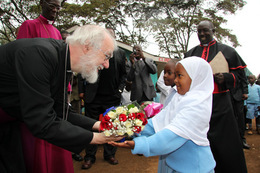Archbishop welcomes UN Secretary General’s Education First initiative
 The Archbishop of Canterbury meets children at a school in Nairobi run by the Anglican Church of Kenya
The Archbishop of Canterbury meets children at a school in Nairobi run by the Anglican Church of KenyaThursday 27th September 2012
The Archbishop of Canterbury, Dr Rowan Williams, welcomes the launch of the Education First initiative by the United Nations Secretary General, Ban Ki-Moon, yesterday in New York.Listen to the Archbishop’s podcast here
The full transcript is below:
One of the important things that all religious traditions hold in common is that they have high hopes for human beings – even extravagant hopes. Education is one of the main ways of making those hopes a reality. That is why the strategic contribution of faith groups and faith leaders to education worldwide is so crucial.
But we shouldn’t be under any illusion about the scale of the challenges we now face. If we want by 2015 to achieve a measurable, dramatic increase in the quality and range of education for children across the world, we have quite a mountain to climb. At the moment there are over 60 million children out of school. There are over 150 million children of school age who are workers. There are some 10 million child brides whose situation prevents them from entering education. There are some 16 million children with disabilities, whose needs are often overlooked here.
All of this matters not just because of the suffering or the humiliation for individuals, but because education is the key that unlocks so much else - that unlocks the potential for development, a development which is not something imposed from outside but which is about the development of whole persons, taking responsibility for their world.
That is one of the main themes that emerged at a recent high-level consultation held here atLambethPalaceon the effect of armed conflict on children and education. Everybody agreed that what we really most wanted out of education was people able to take decisions about their world, to take decisions that changed it – changed their own circumstances and those of others.
The leaders of faith groups across the world need to rally together to this cause, to press our governments and other agencies to rethink some of their attitudes about education, and especially about its place in humanitarian aid. At the moment it’s only about 2 percent of humanitarian aid that goes towards education. And yet, as I’ve said, this is the key to so much else. Miss out on this, and in the middle to long-term you’ll miss out on so much else.
In so many areas of the world, especially in developing countries, it is faith-based groups that provide schools in various kinds of cooperation and partnership with governments.
So for the sake of our children worldwide, for the sake especially of girl children (and we must remember again that the role of women in development is so crucial), for the sake of educating people in a humanity that’s active not passive, for the sake of honouring that mystery and that dignity that our religious traditions see in every person, I sincerely hope that the leaders of our faith communities will rally to this and hold up this vision for themselves, for their governments and for all those involved in seeking to realise the Millennium Development Goals.
